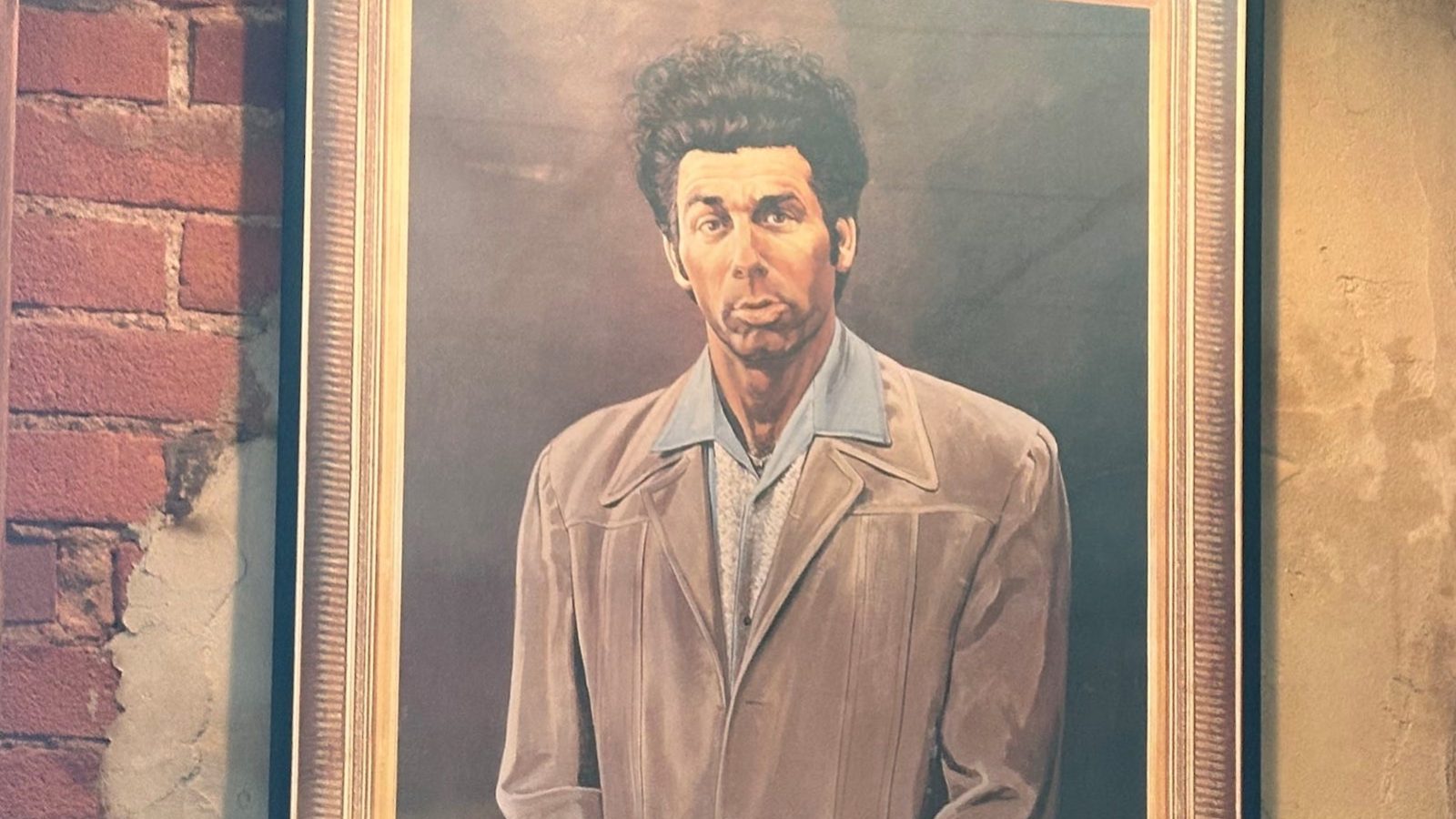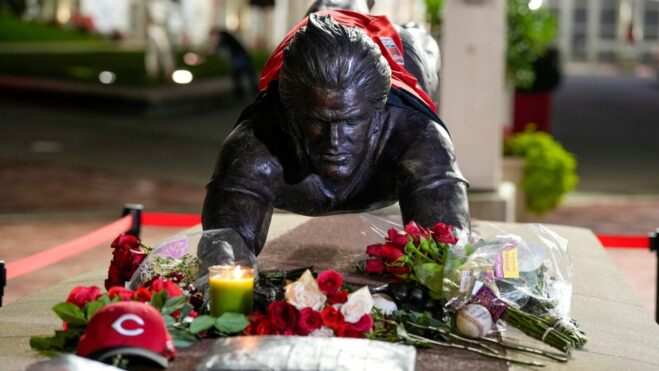Nine Times ‘Seinfeld’ Told Us Kramer Was A Serious Problem Gambler
Would a responsible gambler say, ‘That’s a cool G, Daddio — now you gotta let it ride?’
7 min

There is no gambling and no direct reference to gambling in the Season 5 Seinfeld episode “The Glasses.” These 22 minutes of sitcom gold are best remembered for the fact that the future Skyler White — actress Anna Gunn — plays Jerry’s girlfriend, and for a bewildered Jerry telling George, “You’re eating onions, you’re spotting dimes, I don’t know what the hell is going on!”
But a small, easily forgotten subplot of the episode is Kramer expecting his friend Dwayne the optician to give George a discount on eyeglasses because, years earlier, Kramer helped Dwayne kick his addiction to sugar.
And of course Kramer was able to help an addict … because he, too, was an addict.
Not to sugar. Rather, as the show told and showed us on numerous occasions, to gambling.
Yeah, it turns out problem gambling existed long before the fall of PASPA, long before we were inundated with commercials in which Jamie Foxx instructed the masses to “put some skin in the game.” Who knew?
The Seinfeld writers’ room knew. And the folks in there had a lot of fun with it. Here are nine different episodes from across the show’s nine seasons that offered a glimpse at Cosmo Kramer’s gambling problem.
‘The Pony Remark,’ Season 2, Episode 2
In this very early episode — you can tell it’s early because Kramer’s hair was barely two inches high — we learn that he is some 30 years ahead of his time in insisting the operator void his bet because it didn’t go his way.
He tells Jerry of his plan to build “levels” into his apartment, Jerry insists there’s no chance the K-Man will follow through on it, and so a wager for dinner and dessert is proposed and pinkie-shaken on.
But when Kramer abandons the levels project without even starting it, he argues that there is no bet to grade.
It’s like if you bet on a starting pitcher to go over 5.5 strikeouts, but he gets shelled and the manager has to yank him in the first inning, so you insist to the sportsbook customer service representative that the bet should be voided because the pitcher wasn’t in the game long enough to find out if he could record six strikeouts.
This incident does not exactly offer evidence of Kramer’s addiction to gambling, but it shows he will make wagers rashly and take the clear losing side, then not take responsibility for his lousy bet — a building block of potential problem gambling.
‘The Subway,’ Season 3, Episode 13
Around the time Seinfeld was making the transition from “under constant threat of cancellation” to “part of the cultural zeitgeist,” the show gave us our first extended look at Kramer on the gambling/sweating emotional rollercoaster. His game of choice: betting on the ponies.
The short synopsis: While riding the subway, Kramer overhears informed chatter about a horse named Papa Nick and goes to the OTB to try to win big on the 30/1 longshot. And win big he does, but not until after briefly going on tilt thinking his bet was going to lose, and not until after Michael Richards had harnessed (pun somewhat intended) his physical comedy gifts to ride an imaginary horse across the finish line.
Does using inside information make Kramer a sharp advantage player? Or is he a donkey for trusting a random guy who claimed “his mother was a mudder”?
We’ll go with donkey, on account of Kramer celebrating his big win so publicly and nearly getting himself mugged as a result. A gambling sharp plays it much cooler than that.
‘The Contest,’ Season 4, Episode 11
It’s the most famous wager in Seinfeld history, and possibly all of TV history.
The gang is discussing … you know … and before long, George asks Jerry, “Care to make it interesting?” Kramer wants in immediately, repeating his propensity from the “levels” situation for gambling without thinking.
And it goes as well for Kramer as everyone but him knew it would.
(For what it’s worth, in the series finale, George revealed that he cheated in the contest. Kramer wasn’t the only one among the core four with some problematic gambling habits.)
‘The Diplomat’s Club,’ Season 6, Episode 22
If you’re looking for a single episode to show the depth of Kramer’s gambling addiction, it’s this one.
It starts with George throwing an innocent bet idea out there, and an almost twitching Kramer pounces with, “How much? A hundred dollars? Two hundred? A thousand?” When Jerry reminds George, “You know he’s not supposed to bet” (the first time the show has told us overtly that Cosmo is a problem gambler), Kramer objects, “Come on, Jerry, it’s a lock!”
We learn that the K-Man has had his gambling problem under control for “almost three years” — since “The Contest,” we suppose? Or maybe since “The Subway,” if the characters felt entering the contest didn’t count as gambling? It’s hard to say; continuity in old sitcoms is not always a priority.
Later in the episode, while sitting in the titular Diplomat’s Club at the airport, Kramer — against his better judgment — starts betting with a man named Earl in a cowboy hat over flight arrivals, beginning at $200 and heading skyward until he’s going double or nothing for $3,200 and has to call Newman for a loan of sorts.
Kramer is, as Newman identifies, a “weak, weak man.”
In the end, Kramer wins — only to get busted for what Earl thinks is manipulation of the outcome. One of their wagers was on a flight from Ithaca, a flight that was delayed by a meltdown from Jerry. In real-world gambling terms, Jerry unintentionally pulled a Luis Ortiz and threw one too many sliders in the dirt, raising Earl’s integrity alarms.
‘The Maestro,’ Season 7, Episode 3
“You like to gamble, Cosmo?” Frank Costanza asks. “You know how it is,” Kramer replies.
In fairness to Kramer, his gambling over games of pool with his buddy’s dad is fairly responsible, with just $5 on the line. Still, real-money gambling is real-money gambling. And when Kramer finds a superior cue to use, he immediately shifts into overconfident-gambler mode, telling Frank, “I got a hunch, fat man, I can’t miss.”
Even if a bit of pool hustling for a single Abe Lincoln isn’t particularly problematic, it can prove a gateway to worse betting behavior …
‘The Sponge,’ Season 7, Episode 9
Would someone who has his gambling habit under control stay up all night playing poker on the eve of his participation in the AIDS Walk?
If you wanted to defend Kramer, you could make the case that this was as much about socializing and smoking cigars as it was gambling. Then again, smoking and problem gambling tend to go together.
Anyway, there’s no convenient YouTube clip of the Kramer poker material, but here’s something just as good: a blooper reel in which Jerry struggles to keep a straight face.
‘The Little Jerry,’ Season 8, Episode 11
Technically, Kramer does not engage in any gambling in this episode, but others are betting on Little Jerry Seinfeld’s cockfights. And Kramer demonstrates a willingness to skirt the rules, like any gambler using offshores or bookies or going underground would.
“Cockfighting is an illegal and immoral activity!” insists (Big) Jerry Seinfeld.
“Yeah, if you got a loser,” Kramer replies. “But Little Jerry was born to cockfight.”
‘The Money,’ Season 8, Episode 12
Just one week after “The Little Jerry” aired, the post-Larry-David writers room kept the momentum going with a single scene nodding to Kramer’s gambling history.
Kramer is spending time with Jerry’s parents, Helen and Morty, while Jerry is in Atlantic City performing. This is long before the days when everyone had a cell phone, so to reach Jerry, Kramer has to call the casino-hotel where he’s staying.
And he doesn’t need to pick up a phone book or place a call to information.
No YouTube clip here, but here’s the Instagram reel:
Kramer: “Yeah, Bally’s. Jerry Seinfeld’s room, please.”
Morty: “You know that number?”
Kramer: “I used to have a problem.”
And he soon would again …
‘The Susie,’ Season 8, Episode 15
For the first time since “The Diplomat’s Club,” Kramer the problem gambler spirals out of control.
It all starts when his friend Mike Moffit becomes a bookie and offers to take Kramer’s bets. To which Kramer very responsibly replies, “No bets for me, I got a disease.”
Unfortunately Kramer doesn’t stay responsible for long and begins to engage in what the gambling industry calls proxy betting, putting $100 on the Knicks to beat the Pacers by more than 35 points at 10-to-1 odds — in an account with Mike under Jerry’s name.
“That’s some sweet action,” Kramer informs Jerry.
“But I don’t want any sweet action.”
“Well I couldn’t do it, I’ve got a gambling problem.”
“So you put down my money?”
“You don’t have a problem.”
The Knicks proceed to blow out the Pacers and cover, leading the K-Man to declare, like a true gambling degenerate, “That’s a cool G, Daddio, now you gotta let it ride.”
When Jerry asks what he’s going to let it ride on, Kramer puts the grip of gambling addiction on full display: “C’mon, Jerry, I don’t want to lose this feeling,” Kramer says, as he suggests they head down to the OTB.
Where it all began
Before The Contest, before Papa Nick, even before the voided bet on the “levels,” in an episode of TV that aired on March 7, 1986, a bookie who looked an awful lot like Cosmo Kramer tried to rig sports outcomes with a judge who looked curiously similar to NBA legend Bill Russell:
The ‘80s were a truly bizarre time. But the important thing is Kramer survived that attempted murder at the hands of Bill Russell to enjoy many more years of sweet action.






